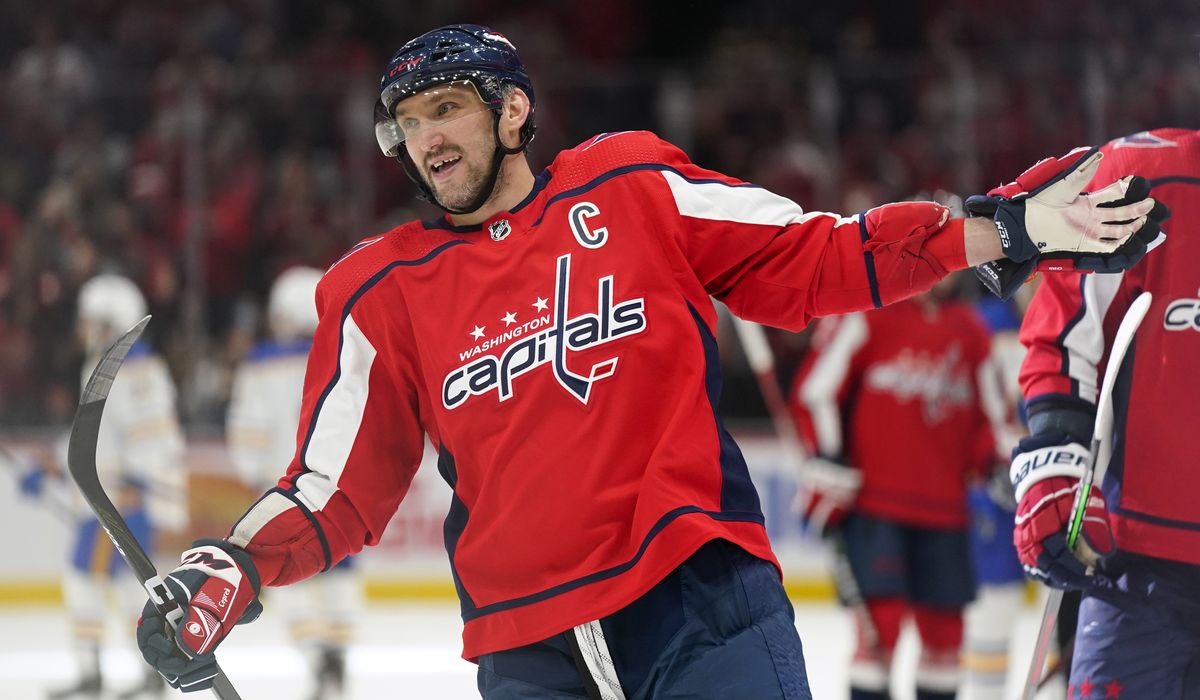
Something’s different — but familiar — about Alex Ovechkin this season.
Over the last few years, the future NHL Hall of Famer has seen his numbers and performance slightly decline.
It was bound to happen. He couldn’t be expected to be the best goal-scorer in the NHL forever.
But through 17 games, the Washington Capitals star looks more like his 26-year-old self than his actual 36-year-old self.
In fact, Ovechkin’s start may be the best of his illustrious career.
As of Thursday, the 17-year veteran was tied for second in the NHL in goals with 12 and is third in points at 26. The only players ahead of him in those categories are Edmonton stars Connor McDavid and Leon Draisaitl, both of whom are in the prime of their careers.
He’s recorded a point in 13 of Washington’s first 17 games, and his 26 points are more than any total he’s achieved in the first 17 contests of a previous season. His previous best was 25 in 2009. But for the previous five years, he was averaging 18 points through this point of the season.
It’s not just the statistics that suggest Ovechkin is looking like his prime self. Earlier this season, Red Wings coach Jeff Blashill said Ovechkin “looks younger.”
“I don’t know how that’s possible,” Blashill added. “He plays with such vigor and energy. It’s pretty cool to watch, as long as you’re not on the bench coaching against him, how excited he still gets to score.”
The accolades have piled up for Ovechkin this season.
The winger started the season by passing Marcel Dionne for fifth all-time on the NHL’s goals list with a two-goal performance against the Rangers on opening night. A little under a month later, he tied Brett Hull for fourth in a win over Buffalo on Nov. 8 and then passed him four days later against Columbus. At 742 career goals, Ovechkin is 24 behind Jaromir Jagr for third, 59 behind Gordie Howe for second and 152 behind Wayne Gretzky for first.
“It means a lot,” Ovechkin said about passing Hull. “When you start playing hockey, when you come to the NHL, you never thought you’d be in that position with those names.”
The game against the Sabres was a notable one for a few other reasons for Ovechkin, who scored and had two assists. He eclipsed the 600-career-assist mark and reached the 20 points on the season in the second-fewest games (12) of any NHL player age 36 or older.
The only player to do it faster was Pittsburgh’s Mario Lemieux in 2002-03 (nine games).
There are a dozen different reasons for why Ovechkin is having the best start of his career — the exemplary play of linemates Evgeny Kuznetsov and Tom Wilson, the motivation to catch “The Great One” and the team’s overall good start, as the Capitals entered Thursday tied for the most points in the NHL standings.
But Ovechkin has said one reason he feels more comfortable this fall than last season’s COVID-19-shortened campaign is because he was able to have a more normal offseason with his trainer, Pavel Burlachenko. Ovechkin scored 24 goals and tallied 18 assists in 45 games last season.
“When you know when the season starts, at a certain time you prepare yourself for the year and it helps you get in a good shape,” Ovechkin said earlier this month. “Last year was kind of a weird year, all the protocols…and the situation, it was kind of frustrating.”
Capitals coach Peter Laviolette noticed a pep in Ovechkin’s step early this season.
“He is playing with pace. He is finding himself with the puck on his stick a lot,” Laviolette said earlier this season. “… He had a good training camp and he’s off and running.”
It’s good that Ovechkin is conditioned, because Laviolette isn’t holding back the minutes for the oldest player on his roster.
Ovechkin’s average ice time is 21:35, which would be more than any season since his age-24 campaign in 2009-10. He averaged 19:30 ice time last season and has hovered around 20 minutes for the last decade.
Part of the increase is the injuries the Capitals have dealt with all season. Center Nicklas Backstrom has yet to play in a game, while forwards T.J. Oshie, Nic Dowd, Lars Eller and Anthony Mantha have all missed time.
“He’s able to play 20-plus minutes every night, even back-to-backs. He’s in really good shape,” Laviolette said earlier this week. “… [Last year] was just a different setup to the season for him. This year, he worked really hard. He has guys that help him get in shape, and he came into camp ready to play.”
Of all his gaudy numbers so far, the most welcome may be his assist total. His 14 assists are only four off the amount he had last season in 45 games and five off his total from 2019-20 in 68 games. Ovechkin averaged 52 assists per season in his first six years, but that fell to 27.7 over the last decade.
The additional helpers are partially why Ovechkin’s plus-minus is tied for fourth in the NHL at plus-12. Ovechkin was a minus player the previous two seasons and hasn’t been plus-12 since 2015-16.
So, just how is Ovechkin doing all this at 36 years old in his 17th season?
“I can’t give away any of his secrets,” quipped Wilson.





